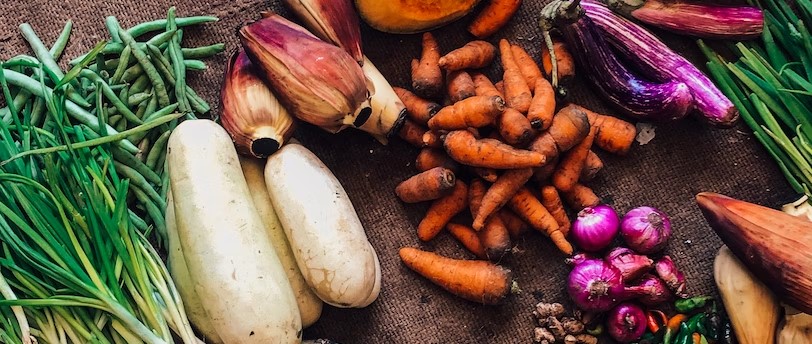Are you looking to make healthier choices when it comes to the food you eat? The organic food revolution may be just what you need. This guide will provide you with everything you need to know about eating clean and incorporating organic food into your diet.
Organic food is becoming increasingly popular and for good reason. It is grown without the use of synthetic pesticides, genetically modified organisms (GMOs), or chemical fertilizers. By choosing organic, you can reduce your exposure to harmful chemicals in your food and support sustainable farming practices that prioritize soil health and biodiversity. In this article, we will explore the benefits of organic food, the difference between organic and conventional farming methods, as well as tips on how to incorporate more organic options into your everyday meals. Whether you are a seasoned health enthusiast or just starting out on your journey toward cleaner eating, this guide has got you covered. So let’s dive in and discover the wonders of the organic food revolution together!
Key Takeaways
- Organic food is grown without synthetic pesticides, GMOs, or chemical fertilizers, reducing exposure to harmful chemicals and supporting sustainable farming practices.
- Organic food is richer in vitamins, minerals, and antioxidants, and lower in nitrates and pesticide residues, making it healthier and containing higher levels of nutrients.
- Organic milk and meat have higher levels of omega-3 fatty acids, providing additional health benefits.
- Switching to organic farming and supporting organic food production contributes to a cleaner and more sustainable future.
Table of Contents

Understanding the Benefits of Organic Food
Imagine walking through a vibrant farmers market, surrounded by tables overflowing with fresh, locally grown produce that is bursting with flavour and nutrients. This is the beauty of organic food. The importance of organic certification cannot be overstated when it comes to ensuring the quality of the food you consume. Organic certification guarantees that the food has been grown without synthetic pesticides, genetically modified organisms (GMOs), or artificial fertilizers. By choosing organic, you are not only supporting sustainable farming practices but also protecting your health.
The health benefits of organic food are numerous and significant. One major advantage is that organic fruits and vegetables are richer in essential vitamins, minerals, and antioxidants compared to conventionally grown produce. Studies have shown that organically grown crops contain higher levels of vitamin C, iron, magnesium, and phosphorus. Additionally, they are lower in nitrates and pesticide residues which can be harmful to human health.
Moreover, choosing organic means reducing your exposure to potentially harmful chemicals commonly found in conventional foods. Synthetic pesticides used in conventional agriculture have been linked to various health problems such as cancer, hormonal disruption, and neurotoxicity. By opting for organic food, you minimize your intake of these harmful substances and contribute to a cleaner environment.
Understanding the benefits of organic food is crucial in making informed choices about what we consume. Organic certification ensures that our food is free from synthetic chemicals while maximizing its nutritional content. By incorporating more organic produce into our diets, we can enhance our overall well-being and support sustainable farming practices for a healthier planet.
The Difference Between Organic and Conventional Farming
Discover the stark contrasts between how your food is grown through organic and conventional farming methods. Organic farming methods prioritize the use of natural fertilizers, such as compost or manure, and biological pest control to maintain soil fertility and prevent pests. On the other hand, conventional farming techniques rely on synthetic fertilizers and pesticides to maximize yields. These chemicals can have long-term negative effects on both human health and the environment.
Organic farmers focus on building healthy soil by using techniques like crop rotation and cover cropping. By rotating crops, they can break pest cycles naturally without relying on chemical pesticides. Additionally, cover cropping helps prevent erosion and enriches the soil with nutrients, reducing the need for synthetic fertilizers. This approach promotes sustainable agriculture that supports biodiversity and minimizes environmental impact.
In contrast, conventional farming relies heavily on synthetic inputs to increase productivity. Chemical fertilizers provide plants with essential nutrients but can also lead to nutrient imbalances in the soil over time. Pesticides used in conventional farming may help control pests in the short term but can harm beneficial insects, contaminate water sources, and contribute to pesticide resistance among pests.
Understanding these differences between organic and conventional farming methods allows you to make informed choices about your food consumption. By supporting organic agriculture, you are not only promoting healthier food options for yourself but also contributing to a more sustainable future for our planet by reducing chemical use in our food production systems.
Tips for Incorporating Organic Food into Your Diet
Try incorporating more organic options into your meals to experience the full flavors and nutritional benefits that come with supporting sustainable farming practices. Eating organic doesn’t have to break the bank, as there are many budget-friendly options available. Start by focusing on organic fruits and vegetables that are in season, as they tend to be more affordable. Additionally, consider buying in bulk or joining a local CSA (Community Supported Agriculture) program, which can provide you with a variety of fresh, locally grown organic produce at a lower cost.
Finding organic food locally is easier than ever before. Begin by visiting your nearest farmers market, where you can find a wide range of organic fruits, vegetables, meats, and even dairy products directly from local farmers. Not only will you be supporting small-scale agriculture, but you’ll also have the opportunity to connect with the people who grow your food and ask them questions about their farming practices. Another option is to join a co-op or natural foods store in your area. These establishments often carry a selection of affordable organic products and may offer discounts for members.
Incorporating more organic food into your diet doesn’t have to be overwhelming or expensive. Start small by making simple changes such as switching out conventional milk for organic milk or opting for organic versions of your favorite snacks. Gradually increase the amount of organic items on your grocery list until it becomes second nature. Remember that every step towards eating more sustainably makes a difference not only for yourself but also for the environment and future generations. With these tips in mind, you can enjoy the benefits of clean eating while supporting local farmers and promoting sustainable farming practices , ultimately creating a healthier and more sustainable food system for all.
The Environmental Impact of Organic Farming
Switching to organic farming practices can have a positive impact on the environment by reducing the use of synthetic pesticides and fertilizers. Organic farmers rely on natural methods to control pests and diseases, such as crop rotation, biological pest control, and the use of compost and manure for fertilization. This reduces the carbon footprint associated with conventional farming, as synthetic pesticides and fertilizers are often derived from fossil fuels.
Organic farming also promotes soil health, which is essential for sustainable agriculture. By avoiding the use of chemical inputs, organic farmers allow beneficial microorganisms to thrive in the soil. These microorganisms help break down organic matter into nutrients that plants can absorb. Additionally, organic farmers focus on building soil fertility through practices like cover cropping and mulching, which help prevent erosion and improve water retention.
Furthermore, organic farming practices can contribute to biodiversity conservation. By avoiding synthetic chemicals that may harm wildlife, organic farms provide habitats for many species of plants and animals. Studies have shown that organic farms support higher levels of biodiversity compared to conventional farms.
Switching to organic farming practices can reduce the environmental impact of agriculture by minimizing the use of synthetic pesticides and fertilizers. It also promotes soil health and biodiversity conservation. As consumers become more aware of these benefits, supporting organic food production can be a powerful way to contribute towards a cleaner and more sustainable future for our planet.
Debunking Common Myths About Organic Food
You may have heard some misconceptions about organic food, but let’s debunk those myths and set the record straight. One common misconception is that organic food is not healthier than conventionally grown food. However, multiple studies have shown that organic fruits, vegetables, and grains contain higher levels of nutrients such as Vitamin C, iron, magnesium, and phosphorus. Additionally, organic milk and meat have been found to contain higher levels of omega-3 fatty acids. These health benefits can contribute to a stronger immune system, better digestion, and overall improved well-being.
Another myth surrounding organic food is that it is too expensive for the average consumer. While it is true that organic products often carry a higher price tag compared to conventional options, there are ways to make them more affordable. Shopping at local farmer’s markets or joining a community-supported agriculture (CSA) program can provide access to fresh and affordable organic produce. Planning meals ahead of time and buying in bulk can also help reduce costs. It’s important to remember that investing in your health through high-quality food can save you money on medical bills in the long run.
Lastly, some people believe that organic farming practices are not sustainable enough to feed the growing global population. However, research shows that organic farming methods can actually be more environmentally friendly than conventional ones. Organic farmers prioritize soil fertility through techniques like crop rotation and composting rather than relying on synthetic fertilizers or pesticides. By avoiding harmful chemicals and promoting biodiversity on their farms, they contribute to healthier ecosystems and protect wildlife habitats.
Despite common misconceptions about organic food being no healthier than conventional options or too expensive for the average consumer, evidence suggests otherwise. Organic food offers numerous health benefits due to its higher nutrient content compared to conventionally grown alternatives. While it may require some strategic shopping practices to make it more affordable, investing in your health through organics can pay off in the long run both physically and financially. Additionally, organic farming methods can be more sustainable and environmentally friendly, making them an important part of the solution to feeding a growing global population.
Conclusion
In conclusion, embracing the organic food revolution can have numerous benefits for your health and the environment. By opting for organic produce, you are making a conscious decision to nourish your body with nutrient-rich foods that are free from harmful chemicals and pesticides. Studies have shown that organic food may contain higher levels of vitamins, minerals, and antioxidants compared to conventionally grown food.
Additionally, supporting organic farming practices contributes to a healthier planet. Organic farms prioritize soil fertility and biodiversity by avoiding synthetic fertilizers and genetically modified organisms (GMOs). This helps protect our water sources from pollution and reduces the carbon footprint associated with conventional agriculture.
While some people may have concerns about the cost of organic food or its accessibility, there are various ways to incorporate it into your diet without breaking the bank. Shopping at local farmers’ markets or joining community-supported agriculture programs can often provide more affordable options. Additionally, focusing on seasonal produce can help reduce costs while still reaping the benefits of organic eating.
It is important to note that while organic food offers many advantages, it is not a cure-all solution. It is essential to maintain a balanced diet overall by incorporating a variety of fruits, vegetables, whole grains, lean proteins, and healthy fats into your meals. Remember to consult with healthcare professionals or registered dietitians for personalized advice on nutrition.
By understanding the benefits of organic food and making informed choices about what you consume, you have the power to contribute positively towards your own well-being as well as the sustainability of our planet. So why not start incorporating more organic options into your diet today? Your body and Mother Earth will thank you!

